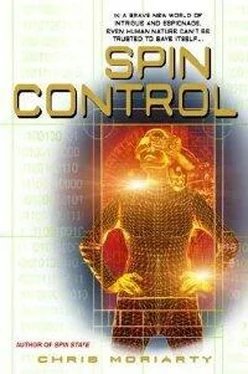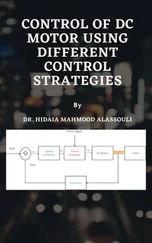“Et pourquoi tu veux te compliquer la vie?” he asked. Why do you want to complicate your life?
Why indeed?
“For a friend.”
“I hope he is a good one.”
“The best.”
Or the worst.
Because the truth was that Cohen still hadn’t decided whether he was doing this for Didi or for Gavi. And he was betting his peace of mind on a single article of faith: that when all the twists and turns were over the two of them would turn out to be on the same side.
The first sign Arkady saw that Cohen’s message had gotten through was a marked uptick in Moshe’s already-healthy sense of paranoia.
Moshe interpreted the Palestinian request for a second session with Arkady as a symptom of some grave security breach. Osnat began to look increasingly harried. Ash Sofaer flew out from Tel Aviv, apparently for the sole purpose of staring coolly at Arkady, asking a few unconnected questions, whispering into Moshe’s ear for a few minutes, and flying back home again.
“You’re hearing grass grow,” Osnat told Moshe finally.
“If I’m hearing grass grow,” Moshe said, “maybe it’s because grass is growing.”
Meanwhile, Arkady asked himself constantly what he could do, what he should do, about the revelation he’d experienced in the face of Gavi’s flowcharts.
He was by now absolutely certain that his first intuition had been right. Korchow’s “genetic weapon” had merely been the ball Korchow wanted the bidders to keep their eyes on. The real virus was already infecting the buyers every time they touched Arkady or talked to him or stood in the same room with him.
Arkady had seen the signs himself. He’d just read them wrong. For Arkady, used to the strong medicine of Syndicate immunoresponses, the slower maturing, more diffuse human immune response had looked like minor allergies, nothing more. Either that or the humans hadn’t really started getting sick yet.
His first reaction to the way Korchow had used him was outrage. He had never consented to be used as some sort of interstellar Typhoid Mary. And it was all very well to talk about throwing Earth into chaos in order to save humans in the long run…but Arkady had gotten to know some of those humans. And he didn’t relish the idea of handing out smallpox blankets to people like Osnat and Gavi.
Gradually, however, his outrage was eclipsed by fear. A second realization had come close on the heels of the first one and shaken him to his core like the aftershock of an earthquake flattens buildings still precariously standing after the first assault. He’d spent four months on Gilead while Korchow and his team interrogated him. During those months, Korchow and others had sat across tables from him, shared meals with him, passed hour after hour with him. Still others had prepared his food, washed his clothes and bedclothes, cleaned up the intimate entropy of daily life. There was no hope of maintaining anything like effective quarantine in the constantly recirculating air of an orbital station, so he could only assume the worst.
And if the worst had happened, then Korchow hadn’t launched Arkady toward Earth in an offensive attack. He’d sent him as a desperate last-ditch effort to buy the Syndicates some time and better their suddenly radically diminished chances of survival.
Arkady was still trying to decide how he felt about this—and what he should do about it—when the two humorless young men who’d flown in from Tel Aviv with Ash smuggled him across the Line and handed him over to the green-eyed boy, Yusuf.
There was a room.
There was a desk.
On the desk there was a single blank sheet of paper.
Behind the desk there was a man.
The man looked kind, slightly harried, moderately intelligent, and completely unremarkable. Average height, average coloring, average build running to sedentary flab in middle age. The bland gray buttoned-down look of conformity that Arkady was already learning to associate with midlevel bureaucrats and low-level career military officers.
A timeserver, Arkady decided. Short on initiative, originality, and imagination. Good at pushing the paperwork through on time. The kind of man who made it hard to believe humans had ever had the brains to bootstrap themselves out of the gravity well.
“Hello, Arkady,” the man said in fluent, unaccented English instead of the UN-standard Spanish that was Earth’s lingua franca. That was the first surprise.
Arkady had been gazing at the floor, but now he glanced up sharply and found himself staring into the man’s eyes. And that was the second surprise.
The man’s eyes were brown. Not the liquid velvet of a Rostov construct’s eyes, let alone the intense black of Gavi’s eyes. Just the normal expected brown that usually went with Mediterranean coloring. Ordinary, like everything else about him. But you couldn’t look into those eyes and not know that they belonged to a thinking man who had done and seen enough in the world to be long past proving things.
“You’re Walid Safik,” Arkady said.
“So they tell me. Sit down, Arkady.”
Arkady sat down, trying to put the man before him together with the aura of mystery and danger that surrounded Absalom.
“Did you have a nice talk with Gavi?” Safik asked. “Oh, don’t look like that. I’m not pumping you for information. Not yet, anyway. Just curious. Gavi married my favorite cousin, did you know that? I danced at their wedding. Well, figuratively speaking. I don’t think I actually danced. I was a pretty bad dancer even before I got fat. My wife says so, and when she says rude things about me they’re usually true. Tell me, how did Gavi strike you?”
“In what way?”
“Personally. Did you like him? Never mind, of course you did. Everybody does. Or they used to, anyway. But did he seem happy within the obvious limitations?”
“He seemed fine, I guess.” Arkady remembered the missing leg and shuddered involuntarily. How did people down here talk about that sort of thing? There seemed to be a terrible number of people on Jerusalem’s streets with missing or deformed body parts. Did the commonness of such horrors make them lighter to bear and easier to talk about? Or did it just make them all the more frightening? “I doubt I know him well enough to tell whether he’s happy or not.”
“Fair enough. But there’s no harm in asking, is there?”
Safik got up, walked to the door, and conferred briefly with Yusuf. When he came back he had a pack of cigarettes in his hand.
“Do you mind?” he asked. “I’d open the window, but some idiot painted it shut last year.” He lit the cigarette and sucked at it with the intensity of an addict. “Terrible habit. I picked it up in my twenties because I was seduced by all those old romantic spy movies where interrogations happen in a haze of cigarette smoke. And when the romance wore off, I was left with the smoking. And when I tried to quit I just got fat, then started up again anyway. So now I’m a fat old man who smokes too much and has no youthful illusions to fall back on.”
He set the lighter down on the table between them, spun it around like a top, and watched it flash black and silver and black and silver and black until it drifted to a halting stop. “So what do I do now, Arkady? Do I try to outcharm Gavi? Do I try to outwit Korchow? Do I spin you around”—he flicked the lighter back into motion—“until you don’t know which way is up or who you can trust?”
Arkady looked up from the glittering spin of the lighter to find Safik gazing at him with those calm, extraordinarily ordinary eyes.
“Which body has Cohen brought down this time, by the way? Not the little Italian actress by any chance?”
“No…um. A boy.” He paused, suddenly uncertain even of that. “I think it’s a boy. It wears suits. They call it he. ”
Читать дальше












